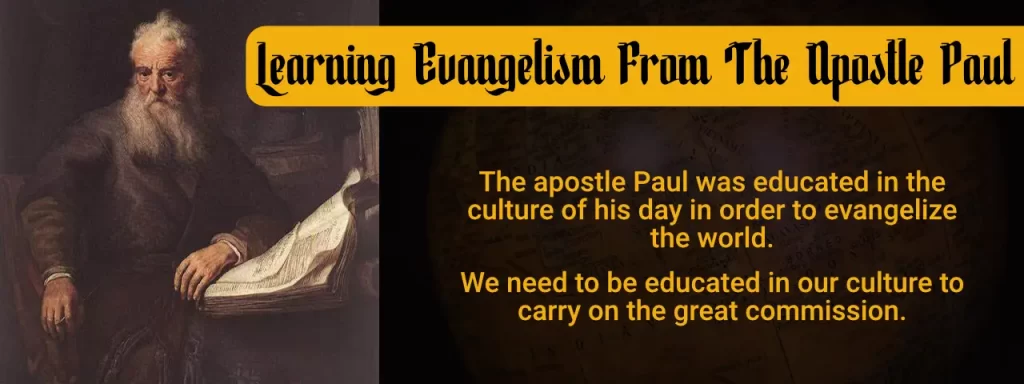It is this generation’s job to reach this culture with the gospel.
It is up to us, this generation, to make sure the gospel is articulated to a culture unique in world history. At no other time has the proliferation of information been so great. Knowledge is increasing, but wisdom is in great need.
Learning evangelism from Paul means understanding the differences between his day and ours.
We can look at the apostle Paul and his day. Paul was a mighty proclaimer of the truth. However, what Paul was fighting in his day differs from ours. Paul was fighting Jewish legalism and pagan gods. Paul’s world was centered around the spiritual world.
Today, our battles are not in the synagogue or pagan temples but in university classrooms and online. We can take note of Paul and how he dealt with the topics of his day, but we must speak to our issues. The issue today is not the supernatural but the natural. I know that everything has a spiritual side, but to the lost person, that is not on their minds.
God used Paul, a learned man, to spread the gospel.
Paul had to deal with a proper understanding of the law and traditions. Nobody is trying to tell people to be saved except by the law and circumcision. They say there is no God, and science proves it. It is the scientism doctrine that is keeping people from the gospel.
We must be able to deal with this intelligently. As Paul was educated in the law and understood the tradition, we must be educated in science and its theories. However, we do not have to go at this alone because God has called out men to help us. In my estimation, there is a modern-day Paul named John Lennox.
John Lennox is a modern-day apostle Paul.
I will defend this claim. Here is an excerpt from Wikipedia.
“He retired from professorship where he specialised in group theory. He is Emeritus Professor of Mathematics[2] at the University of Oxford and an Emeritus Fellow in Mathematics and Philosophy of Science at Green Templeton College, Oxford University. He is also an Associate Fellow of the Saïd Business School and a Senior Fellow at the Trinity Forum.”
Paul did his evangelism based on his knowledge of his culture.
Paul was respected for his knowledge of the law and his uncompromising stand. The scientific community recognizes Dr. Lennox for his expertise and credentials. Like Paul fighting off the false teachings of the Pharisees, Dr. Lennox has taken on the New Atheist. He takes an uncompromising view of scripture. His opponents have scoffed at his unapologetic stand on miracles and the resurrection.
Other evangelist.
Three other such people in the Christian circles deal with science and the Bible. They are Ken Ham, Huge Ross, and Francis Collins. Francis Collins started “Biologos“, which promotes theistic evolution. He is the head of the human genome project. Huge Ross is an old earther who runs a ministry called “Reasons to Believe.” Dr. Ross is an astrophysicist whose ministry focuses on understanding the Bible from an old earth perspective. Last, as many know about Ken Ham and the “Answers in Genesis” ministry.
I have read materials from these ministries and see some good in them all, but I also have reservations. Recently, I listened to a book by John Lennox called “God’s Undertaker” and found it to be the best material for understanding and combatting the attack of science on God. I have been referring skeptics and atheists to his book as I could not do a better job of breaking down the issue.
Let’s learn from Paul’s example of how to evangelize.
I want to share with you something that I have learned. I want to start with the words of the apostle Paul.
“For the invisible things of him from the creation of the world are clearly seen, being understood by the things that are made, even his eternal power and Godhead; so that they are without excuse:”
Romans 1:20
“Who changed the truth of God into a lie, and worshipped and served the creature more than the Creator, who is blessed for ever. Amen.”
Romans 1:25
Look at how the problem started.
The modern-day problem of scientism started with the book “Origin of the Species” and the ensuing debates. Those who did not want to believe in God took up the banner of evolution as a way to explain life without a Creator. The problem with evolution was that it required time—a lot of time, and the standard view of Genesis was that God created everything six days about 6000 years ago. So the debate boils down to one thing: time!
Since those early years, many things have been learned about our universe and life. With life issues, evolution has run up against many problems; the main ones are DNA and the amount of time it would take for life to form. The universe was once thought to be eternal, and when the Big Bang became undeniable, many scientists were not willing to accept it had a beginning, as the Bible stated. Today, many top scientists who are self-proclaimed atheists recognize these problems. So secular scientists have time issues to deal with.
Bias will hinder evangelism.
Christians must be open-minded to science that contradicts a particular view of Genesis. The universe is old, and there seems to be no way around that conclusion. It is massive, and if we believe God gave us the creation to teach us (Psalms 19, Romans 1:20), then we must accept the truth. Just as our sun rises every morning, we can rely on laws that govern our world. Gravity is not in flux, and neither is the speed of light.
Does this understanding of light make sense?
If you were to observe the sun and its solar flares, you would have to realize what you are viewing happened in the past. That is because light from the sun takes over eight minutes to reach Earth. So the events are eight minutes old.
Proxima Centauri is our nearest star, and when observed, we realize that the light we see is 4.2 years old. As we move farther into our universe, the light becomes older and older to the tune of millions of years. If we believe that the light we see from the sun is telling a true story, then we must believe starlight from millions of years out is doing the same.
So, both the evolutionist and the creationist must adjust their understanding as the world God created reveals itself to us. We will do a disservice to God if we refuse to accept what He has shown us.
Time is not the issue.
Suppose we set aside the debate about time because time is not on the evolution’s side or a particular understanding of the Genesis creation story; we can move on to a real issue. An agency is where Christians must fight the battle. Understanding how something works and why it exists are two very different things. Dr. Lennox likes to use the combustion engine and Henry Ford. A very profound point is just because you know how an engine operates does not mean Henry Ford did not exist.
Here is where we need to be clear. The “Kitzmiller v. Dover Area School District” trial is an excellent example of failing to make a proper distinction. The Dover school board wanted to have Intelligent Design taught in the science classroom. The problem with this is that ID is not empirical science. It is more along the lines of forensic or historical science. It is noted that single-cell life-to-man evolution is not empirical science either.

Agency verse mechanism.
So, where we need to stand our ground is on agency. Genesis is not a scientific account of creation; it is a historical teleology. We must also clarify that natural selection and mutation form a teleology that is not science. If we want to have our children taught this, it cannot be done in the science classroom; it must be done in a philosophy classroom. We must discuss the ramifications of unprovable views of how life came to be.
We will lose a generation if we continue to demand a time-centric view of Genesis based on science. It is unnecessary for the Biblical story or a clear understanding of the creation account. I know that is hard for some to believe because we have been raised with a biased view on either side of the topic.
I will say this: it seems clear that human life on Earth is young; no matter how old the Earth and the universe are, we can trace the genealogies back to Adam. Not only that, but the archeological history of civilization goes back only thousands of years. In this case, time is on the side of Genesis.

